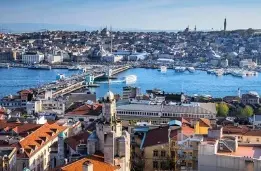By APD writer Muhammad Sohail
Turkey has been trying to diversify its tourism industry to luring more and more holidaymakers into the country from across the world, local media reported Friday.
The head of the Turkish Hoteliers Federation, Osman Ayık, said that Turkey is working to reach and attract tourists from South Korea, China, India and Brazil.
In 2016, the number of adverse incidents caused as sharp declined in the number of foreign tourists visiting the country, especially from Russia, Germany and Britain that are always Turkey’s traditionally largest markets.
Following the 2016 developments, government, as well as private industry, planned to turn towards searching new markets to get the country free from the dependency on certain countries.
The businessman said that the timely decision and efforts designed to find new markets bear fruits and the number of tourists from other regions increased.
The latest data revealed that more and more travelers from diverse nations spend their holiday in Turkey. In 2017, around 254,000 Poles visited Turkey, whereas this figure soared to 776,000 during the first 10 months of this year.
Likewise, the number of South Korean tourists jumped from 88,000 to 154,000, Indian tourists numbers increased from 57,000 in 2017 to 168,000 in the first nine months of 2019.
Visits from Mexico and Japan soared 235 percent and 126 percent, to 44,948 and 77,889, respectively.
In 2017, around 36,000 people from Brazil visited Turkey, but the number of Brazilian tourists jumped 117 percent from this year to 77,361 in January-September of 2019.
The number of Chinese visitors surged by a big margin from 165,000 to 338,000, the data revealed.
The federation’s head further added that the majority of tourists visiting Turkey are from five or six countries, but now a spike in the number of tourists from other nations have also been seen, adding that Turkey will work more to provide the best facilities to the tourists.
(ASIA PACIFIC DAILY)
 简体中文
简体中文







